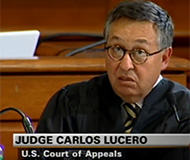Article from: www.thenewspaper.com/news/69/6970.asp
9/1/2020
Court Blasts Speed Kills Justification For Oklahoma City Panhandler Ban
Tenth Circuit US Court of Appeals rejects public safety claim of Oklahoma City, Oklahoma ordinance banning roadside panhandlers.
 Protesters and panhandlers can soon return to the highway medians in Oklahoma City, Oklahoma. The Tenth Circuit US Court of Appeals on Monday struck down the city's attempt to ban panhandling as a violation of the First Amendment. The decision overturns in part US District Judge Joe L. Heaton's decision to allow the city to protect motorists from what officials saw as roadside harassment.
Protesters and panhandlers can soon return to the highway medians in Oklahoma City, Oklahoma. The Tenth Circuit US Court of Appeals on Monday struck down the city's attempt to ban panhandling as a violation of the First Amendment. The decision overturns in part US District Judge Joe L. Heaton's decision to allow the city to protect motorists from what officials saw as roadside harassment.
Enacted in 2016, the ordinance prohibited all but emergency use of medians on roads with a speed limit of 40 MPH or higher. This affects about 400 medians, leaving 76 medians available for protesting and panhandling.
The American Civil Liberties Union (ACLU) immediately brought suit against the measure on the grounds that it undermined the nation's long-standing tradition of free discourse in public spaces. The group also cited city council emails obtained from a freedom of information request that suggested the "public safety" justification was created after-the fact. The three-judge appellate panel agreed that the safety justification did not hold up under scrutiny.
"At trial, the city could not identify anyone injured on a median in Oklahoma City or any accident caused by pedestrian activity on a median," Judge Carlos F. Lucero wrote for the court. "There is neither evidence of any accident involving a pedestrian on a median, fatal or not, nor evidence that a pedestrian on a median caused an accident or distracted a driver enough to compromise the safety of the pedestrian or the driver."
Under Supreme Court precedent, the First Amendment does not allow all speech at every place at all times. In deciding whether the limits imposed by the city were acceptable, the appellate court noted that the medians are similar to sidewalks in being a traditional location for protests. As such, a strong reason would be needed to make them off-limits now. The city contended that it could rely on "studies, anecdotes, history, consensus, and common sense" to support its claim that banning use of the medians improved safety. The court rejected this as "speculative."
"Not only did this generic 'speed kills' evidence not address medians, it also did not address any other factor, including the relationship between fatalities and the width or composition of medians," Judge Lucero wrote. "The fact that plaintiffs may still engage in their speech on roadsides, sidewalks, or other medians does not mean that their speech is not burdened by the revised ordinance... Just as in real estate, location matters in some constitutional questions."
The appellate panel concluded that the ordinance as written violates the First Amendment. A copy of the ruling is available in a 100k PDF file at the source link below.
Source: McCraw v. Oklahoma City (US Court of Appeals, Tenth Circuit, 8/31/2020)
Permanent Link for this item
Return to Front Page
 Protesters and panhandlers can soon return to the highway medians in Oklahoma City, Oklahoma. The Tenth Circuit US Court of Appeals on Monday struck down the city's attempt to ban panhandling as a violation of the First Amendment. The decision overturns in part US District Judge Joe L. Heaton's decision to allow the city to protect motorists from what officials saw as roadside harassment.
Protesters and panhandlers can soon return to the highway medians in Oklahoma City, Oklahoma. The Tenth Circuit US Court of Appeals on Monday struck down the city's attempt to ban panhandling as a violation of the First Amendment. The decision overturns in part US District Judge Joe L. Heaton's decision to allow the city to protect motorists from what officials saw as roadside harassment.